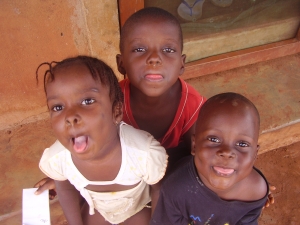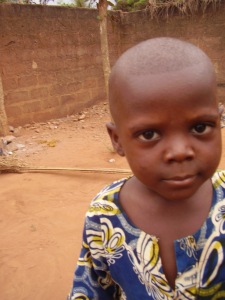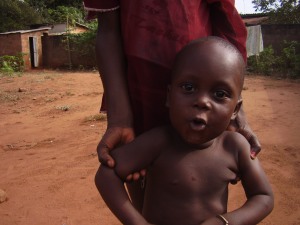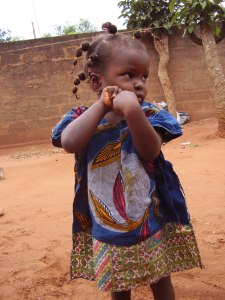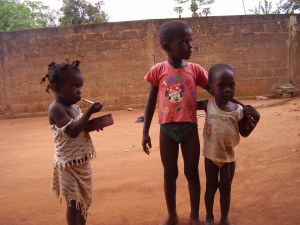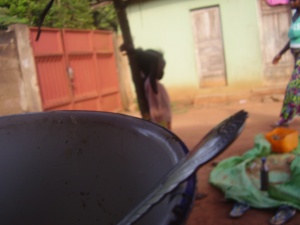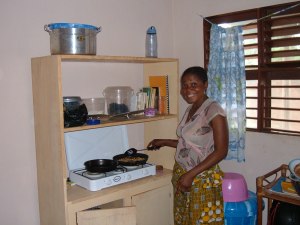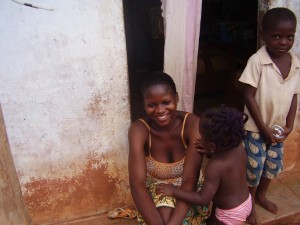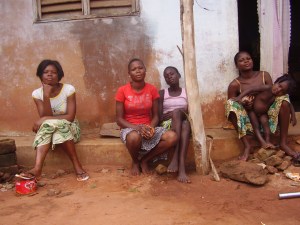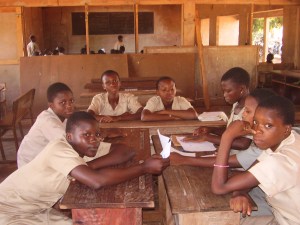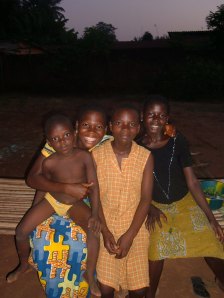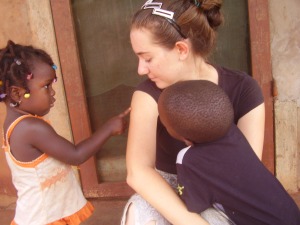The Munchkins
To round out the descriptions of my neighbors….
It’s been a blessing watching these kids grow up, and in the two years, they certainly have changed a lot. Bridgeeti and Ila learned my name and progressed to full blown, babbling commentary and conversations (mostly in Fon but with French mixed in and even a bit of English to count the Macarena or to chant head, shoulders, knees and toes). The babies Caroline and Odie have started to crawl and smile, while responsible older brother Silvan looks on and practices his newly acquired addition and subtraction skills. Through it all, they have annoyed, enchanted, and amused me – often in equally measures.
Silvan at seven is the oldest. He always can make me smile and loves to do whatever I’m doing whether that’s drawing (or getting me to draw for him), pretending to read with me in English, or humming along with my songs before chiming in with ones he’s invented himself. He always invites me to sit outside with them or into their living room to join in the latest round of TV watching. He also gets my jokes and is willing to go along with them – i.e. our most recent jag of how he is literally going to eat us out of house and home to become the world’s fattest homeless boy. Maybe because of that understanding, he’s never pushed me past my annoyance limit – he knows when to leave me alone and helps in getting the others to behave and do the same. It helps that he usually plays the role of translator for the younger ones who don’t always understand enough French to know what I’m saying – although I have mastered the essential commands of stop (bough), wait (notay), and leave that alone (djodo). In short, he’s a happy and responsible kid, one who never fails to brighten my day.
Ila, Celine’s three and a half year old son, is a charmer. And like his mother, he expects the world to go his way. Whenever he wants me to come out and play, he’ll stand by my screen door and echo my name repeatedly. If I ever leave the door open momentarily, he’s immediately inside and poking his nose into everything. In fact, one of the funniest memories I have of him involves him strutting around my living room wearing nothing but my bike helmet and oversized flip-flops. His games and antics have evolved over time, ranging from getting me to twirl him around like a ballet dancer or clapping patterns or pretending to be a gendarme like his dad. A perennial favorite remains his politician practice of going around the room to shake everyone’s hands – usually with multiple circulations. It just goes to show that he loves being the center of attention and in the middle of whatever is going on.
Bridgeeti , Silvan’s younger sister, is a little quieter, a little shier – although she did start talking before Ila. She loves helping me close my screen door, always repeating my merci at the end of the process. She’s a sweetheart who also loves to run into my legs as soon as I get home or to crawl into my lap as I sit on the front porch. In fact, the two of them together often treat me as their personal jungle gym, climbing over me in the midst of their games and entertainment.
I’m not sure if they understand the concept that I’m leaving and not coming back. I’m not even sure if they’ll remember me in ten years. I do know, however, that my Peace Corps experience would not have been the same without them.
I just finished Barbara Kingsolver’s The Poisonwood Bible. Even though it takes place in the Congo, it still manages to capture realities present in Benin. She’s described things I wish I had the words for – both for the sights and rhythms of everyday life and for some of my concerns I have facing my return to the states. So for today, I think I may cop out of writing a blog myself and instead rely on a few quotes paired with the admonition to read the book for yourself.
***
“The usual bypasser is a woman sauntering slowly down the road with bundles upon bundles balanced on her head. These women are pillars of wonder, defying gravity while wearing the ho-hum aspect of perfect tedium. They can sit, stand, talk, shake a stick at a drunk man, reach around their backs to fetch forth a baby to nurse, all without dropping their piled high bundles upon bundles. They are like ballet dancers entirely unaware they are on stage.”
***
“I wish the people back home reading magazines stories about dancing cannibals could see something as ordinary as Anatole’s clean white shirt and kind eyes or Mama Mwanza with her children. If the word ‘Congo’ makes people think of that big-lipped cannibal man in the cartoon, why they’re just wrong about everything here from top to bottom. But how could you ever set them right? Since the day we arrived, mother has nagged us to write letters home…and not one of us had done it yet. We’re still wondering, where do you start? ‘This morning I pulled back the mosquito netting that’s tucked in tightly around our beds because mosquitoes here give you malaria, a disease that runs in your blood which nearly everyone has anyway, but they don’t go to the doctor for because there are worse things like sleeping sickness or the kakaka or that someone has put a kibaazu on them, and anyway there’s really no doctor nor money to pay one, so people just hope for the good luck of getting old because then they’ll be treasured, and meanwhile they go on with their business because they have children they love and songs to sing while they work…’
And you wouldn’t even get as far as breakfast before running out of paper. You’d have to explain the words, and then the words for the words.”
***
”It’s called manioc….[and] has the nutritional value of a brown paper bag, with the added bonus of trace amounts of cyanide. Yet it fills the stomach. It cooks up into the sort of tasteless mass one might induce an American child to try once, after a long round of pulled-up noses and double-dog dares. But for the people of Kilanga fufu was the one thing in life, other than time, that appeared to be taken for granted. There will always be manioc.”
***
“all of them making a noble attempt to plant themselves on American soil. I can see it will not last. When I go with them to the grocery, they are boggled and frightened and secretly scornful, I think. Of course they are. I remember how it was at first: dazzling warehouses buzzing with light, where entire shelves boast nothing but hair spray, tooth whitening cream, and foot powders…
‘What is that, Aunt Adah? And that?’ their Pascal asks in his wide-eyed way, pointing through the aisles: a pink jar of cream for removing hair, a can of fragrance to spray on the carpet, stacks of lidded containers the same size as the jars we throw away each day.
‘Things a person doesn’t really need.’
‘But, Aunt Adah, how can there be so many kinds of things a person doesn’t really need?’
I can think of no honorable answer. Why must some of us deliberate between brands of toothpaste, while other deliberate between damp dirt and bone dust to quiet the fire of an empty stomach lining? There is nothing about the United States I can really explain to this child of another world.”
***
My Neighbors: Celine and Mama Silvan
As I mentioned before, Celine is like my older sister – the perfect mix of bossy and caring. She’s also a force of nature – one of those people who expects the world to go her way and is not afraid to badger others to ensure that it does. Although, this usually works to my advantage as she corrects my cultural faux pas with the same brisk honesty that she chastises anyone giving me a hard time. She calls to check on me if I don’t come home, lectures me if I’m not doing something right (aka usually for not feeding visitors), always invites me in for TV or to share food. She makes sure I’m included – whether that means dragging me to fetes or inviting me to her family’s New Year’s Eve celebrations.
She’s also the perfect person to go to if anything goes wrong. She always finds and contacts the right person and facilitates a solution, intervening on my behalf – whether with problems with my electricity, repairing my water logged phone (a casualty of zemming back to village in a downpour), fixing my front door when it stuck in its frame, or when I thought I had a dead mouse trapped in my back area.
It helps that she knows almost everyone in our neighborhood. She loves to laugh and socialize, ensuring a string of visitors through our concession almost every day. Again though, a fact I cannot emphasize or be grateful for enough, she always makes me feel included – welcoming me not only into her home but also into her daily life and circle of friends. In all the interactions, I think I amuse and perplex her sometimes – but that’s ok – that’s what younger sisters are supposed to do.
Mama de Silvan (aka Delphine – although I’ve only heard her called by her first name once in my two years here) is a little quieter, a little more reserved. Regardless, she looks out for me just as much with a temperament that I think is a lot like my own.
Mama de Silvan represents an African woman’s strength to me. I know Papa Silvan has two wives though I’ve never had the chance or the courage to ask her opinion on the matter. Yet, she never complains. She does not put herself forward but gets the job done while exuding this sense of dignity and friendliness.
What impresses me most about her is that, despite being illiterate herself (she always stops by to ask me to read her text messages), she insisted on hiring a tutor this past year – not only for Silvan but for Bridgeeti as well – to help them with French and learning how to read. Perhaps it’s again not the loudest gesture, but one in her steady way that will change the future.
Family
I seem to have developed the unfortunate habit of scattering pieces of my heart all around the world. Leaving Benin in two (eee!!!!!) months will be just as hard as leaving the states two years ago – perhaps more so as I’m not sure if or when I’ll be able to come back.
I know I’ve said it before, but these people have truly become my second family. Celine’s my older sister – sassy and always willing to equally help me out and tell me what I’m doing wrong. Mama Silvan’s the middle child, a little quieter but again always there for me. Nicole plays the role of my younger sister – a sweetheart following me around (and in true older sister fashion, I’m still in shock about her having a baby!). Which I guess makes me an aunt several times over….to the babies of Nicole’s Rita and Mama Silvan’s Samuel. To Celine’s Caroline who is slowly learning to crawl and babble as she explores the world. To Ila – his impish smile and perchance for crocodile tears; to Bridgeeti and her habit of running straight into my legs every time I come home; to Silvan and his laugh and attempts to mimic my English sentences. And that’s not even mentioning Mama Christine. Emma. Christ-Peace. Prim. Odette. Pascal and his family. All the apprentices at the clinic. All my students both with the health club and the girls’ clubs. All of my round of marché mamas. All of the random individuals in village who I’ve never quite caught the name of, but who always greet me and have welcomed me with open arms.
It’s a brilliant feeling….but it’s going to make September difficult. I don’t know what I’m going to do without them. In the meantime, I’m going to try my best to use these next entries to describe everyone – written snapshots if you will – so no matter where I end up in the world, there memory will always be with me.
Beginning of the end…
The new batch of volunteers arrived in Benin last night. A fact which I still cannot wrap my mind around, even though Peace Corps has been preparing for the arrival for these past few weeks. Closer to home, the clinic’s directrice has also been working on logistics for my replacement – finding a new house closer to the clinic (and actually in the same village rather than a 20 minute bike commute), locating a host family (comprised of one of my health club kids!), and generating a list of project ideas.
It surprised me at first to realize how such a strong feeling of jealousy could creep in with all of those preparations. And yet, I finally realized that my envy does not stem from wanting their experience. It’s not that I want to stay or trade my neighbors for proximity to the clinic – it’s just….I want to recapture that sense of adventure, of having no clue what’s going on, of hearing your village name for the first time, of navigating and negotiating your way through integration – that unique experience of free falling into a community foreign to your own. I guess I’m realizing Peace Corps really does have an end date, and I’m jealous that this group is just starting out while I’m in the process of leaving.
At the same time, it’s fun to indulge in the bit of nostalgia the comparison brings and to remember how far we’ve really come. I even stumbled across our staging workbooks from Philadelphia while starting the process of cleaning out my house. I remember the surreal quality of those first few days, never coming close to imagining what these ensuing two years would bring. That’s almost the fun of it – and I wish this new group all the adventures and surprises (good and bad) of their own.
I also hope to use that nostalgia to jump start a bit of retrospection these next two months before I go – partly due to parental pressure about restarting this blog, partly because I really do want to process the all the moments of this experience. And maybe that way, I’ll also ease that sense of jealousy.
Happy International Women’s Day!
Happy belated Women’s Day (internationally celebrated March 8)! In honor of the celebration, below is a description of one our gender and development summer camps from Maeghan, one of my fellow volunteers and the coordinator of this year’s program. I promise I’m working on another entry with an update on my life, but for now, please read and consider donating.
What is Camp GLOW???
As the title suggests, it’s a camp for Girls Leading Our World (hence GLOW). Each year Peace Corps Benin, as well as various other Peace Corps countries, organize a series of week-long girls’ empowerment camp. The first camp GLOW was organized in 2003 and due to its success, the camp continues to this day.
Why is GLOW important??
The camp brings together Beninese girls, roughly ages 12-15 from different ethnic groups, influential women within their respective communities, and Peace Corps volunteers. Throughout the week, the girls learn a variety of life skills to help them become better leaders and students in their communities. Topics covered include personal financial planning, sexual health and hygiene, computer and internet literacy, goal-setting, HIV/AIDS awareness, study and leadership skills, malaria prevention techniques, arts and crafts, and sports and games to build camaraderie and to encourage cooperation among the young girls. Girls also take excursions to national government institutions and museums, in addition to meeting successful Beninese women in various professional roles. The primary objective of the camp is to encourage girls to stay in school. The Beninese culture remains a male dominant one. As such, females take the place of second class citizens. The education of girls is not viewed as especially important. Camp GLOW works with young girls and attempts to instill within them the importance of an education in hopes they can internalize this and share it with their friends and families in their
villages.
Why is donating important?
Camp GLOW is a part of the Peace Corps Partnership Program. This means, it is a larger scale project and the funding requires two contributors: the community (the participating villages of Camp GLOW) and the partnership (which is where the general public comes in). It is up to us Peace Corps volunteers to find the funding for our projects via friends, family, etc.
If you are interested in donating, or know of anyone who might be, please follow and pass along the following link: https://donate.peacecorps.gov/index.cfm?shell=donate.contribute.projDetail&projdesc=680-247
Happy Valentine’s Day
Any female Benin Peace Corps volunteer will tell you that dealing with the men of his country is one of the most frustrating things about being here. As always, though, humor remains one of the greatest coping mechanisms. So, in honor of Valentine’s Day and without further ado, here’s a collection of some of my best encounters and stories.
Ok I lied – one last caveat that it’s important to note: I’ve never feel threatened in any of these situations– irritated perhaps, but never fearing for my safety. Likewise, these stories and stereotypes by no means represent all Beninese men. I’ve met a lot of upstanding guys who have never been creepy or disrespected me as a person. It’s just that after a few of these experiences, it gets harder not to write them all off.
• Sexism is ugly. And I’ve grown tired of the constant question, “C’est Madame ou bien Mademoiselle?” It’s a question posed even before any attempt to learn my name and often before any greeting of any kind. The worst is when it’s accompanied by the command of, “Cherie, wa” (come dear) – as if to call over a dog – or when it’s uttered in the mocking high voice Beninese think mimics the way French people talk. My standard response is to keep walking: I will not respond to catcalls of dear or sweetheart or any such endearment, and I certainly refuse to give the time of day to people who are impolite and who do not respect me. After all, just as I am more than my skin color, I am also more than my marital status.
• A fellow northern volunteer (who crucially was not as familiar with the city) and I were on zems headed back to the Cotonou workstation. The drivers stopped, half in an attempt to clarify directions and half in a ploy to raise the price mid ride (a jerk move of an entirely different kind). As I tried to interject, my driver stopped me with the command, “Be quiet, cheri-coco (sweetheart), the men are talking.” I swear I almost jumped off the motorcycle to walk the rest of the way home.
• On my way to visit another volunteer’s village, a twelve year old boy sprinted after my zem for about 50 feet yelling, “Tu es belle, Madame, tu es belle” (You are beautiful, you are beautiful). Quite flattering, even if my helmet and the speed of transit meant he was really only commenting on my skin tone.
• Another day, I met another young boy on a walk exploring my own village:
Boy: Hello madame. Do you like eating pate?
Me: Yes. Especially with sauce legume.
Boy: Ok. Well do you want to marry me?
Kudos for trying to think of my long term comfort staying in Benin, but a better question may have been, “Can you prepare pate?” To which I hope I would have had the wit to laugh and reply, “Why no. That’s what a husband is for!”
• That’s one approach volunteers use – agree to become a wife, but only if the man is willing to do the work and become a lower tier third or fourth husband. We’ve jokingly decided that 4 is a good number: the first you actually like, the second for cooking, the third for cleaning, the fourth for laundry, and I suppose eventually a fifth for child care. The real payoff comes from the flabbergasted look on the man’s face as he tries to compute the idea of men doing those tasks or the even wilder idea of allowing polygamy to go both ways.
• My own strategy, one again suggested and used by other volunteers, is to claim a preexisting boyfriend back in the states. I had not originally thought to use this ruse, but after answering truthfully my host family’s inquiry about my relationship status and receiving an exhaustive list of all of their available male relatives (complete with promises to introduce me), I quickly changed my mind for the sake of simplicity. Since then, the scheme has served me well although the questions do always seem to follow the same trajectory. After bringing up my fictional man, my conversational partner quickly moves to ascertain 1. His location – the US; 2. His occupation – student; and 3. We immediately skip any other details about names or such to begin a concerned conversation and line of questioning regarding his fidelity. For example, a conversation with my directrice’s daughter:
Her: So do you have a boyfriend?
Me: Oh yes. He’s in the state’s finishing his studies.
Her: But when you’re over here, how do you know he won’t find someone else?
Me: He won’t. He’ll be faithful.
Her: Michelle, (giving me a look) how can you be sure?
Me: I’m sure.
Her: Michelle, (continuing to give me concerned looks and switching to a more serious tone) are you sure?
Me: (still semi smiling) Yes.
Her: (again – this time in English to make sure I understand) Are you sure?
Me: (trying vainly to remain polite) Yes.
Her: (pause as she processes) Well do you have any boyfriends in Yevie?
• I met my exotic fruit lady on a walk one morning. She insisted I accompany her to see a house her family was building. I saw the floor plans and returned home…only to receive a visit an hour or two later as my fruit lady had arrived with a zem to ferry me to meet her older sister who had come in from Cotonou bringing cement. I again complied, thinking it was a saluering thing. Instead, I got my first proposition of the day as they wanted to set me up….aka get me engaged…to a son currently living in Canada. Granted, it would make the geography easier, but never the less, I apologized by bringing up my fictional boy. Another win for my imaginary love life. Then their own apologies started, “Oh we’re sorry – we didn’t mean to disrupt your schedule. We thought you were single. You can go now.” So you wouldn’t have wanted to meet me if I were married? To top it off, on my walk back home (no zem for the return trip) an older man (60s maybe) provided the second proposal by greeting me, shaking my hand, keeping my hand, and dictating – we need to get married. Again, quick excuse that I’m already taken, retrieval of my hand, and a remaining walk of suppressed laughter. After all, what else can you do? I’m going to take it as a compliment that so many people want to see me as a bride.
Odds and Ends
I restarted my girls’ club last week, expanding to include the 4eme girls from last year as well as a new batch of 5eme students (which roughly translates to 8th and 7th grades respectively – in the French system, schooling counts down until you reach your premier and then terminal (i.e. BAC) year). After last week’s introduction (rules, expectations, review, etc.), we continued this week with a focus on gender roles and a game to tease out their ideas and definitions of such: each girl received a word or phrase that they had to immediately categorize as masculine, feminine, or both. I’m impressed with them for classifying things like going to school or playing sports or writing a novel or being a TV spokesperson as the purview of both sexes. However, it’s interesting to see them place tasks like cleaning the house, getting water, sweeping, taking care of children, etc. as exclusively things women do. Meanwhile, the single masculine prerogative: decision making for the entire family.
That same attitude bled a little into my health club lesson for the week. With the help of Christine, the directrice at the clinic, we (key here to remember the audience is a mixed gender group of high school students) learned about the importance and variety of family planning methods. (My contribution remained with introductory games and writing everything on the board leaving the much harder task of actual explanations to Mama Christine). At the very end, Mama Christine had brought condoms to distribute to the kids. A few of the boys piped up, “Wait – those are just for the guys right? The girls cannot have them.” I’m proud of myself for the quick comeback, “Of course they can! They are the ones who would actually have the baby and do all the work!”
As always, it seems I’m leaning towards a gender rant – to balance it out, here’s a cultural observation from the other end of life’s spectrum. The father of one of the clinic apprentices passed away sometime this past month and today was the burial. Hence, I spent my morning semi awkwardly standing in a field with the clinic staff and people from the village as Beninese men heaped dirt into a burial hut. I never got an explanation for why he was buried on a plot of the family’s land instead of a ceremony, but apparently it isn’t that uncommon. Sometimes, I’m informed, the relative even gets buried beneath the floor of the family’s home.
The rest of the process was likewise a bit foreign as the family is expected to host a party (i.e. like all parties here – a meal to feed everyone) following the funeral for all of the friends and neighbors. Those guests will give money to offset the cost, but the brunt of the work still falls on the grieving family. I tried to explain that that was the opposite of the states: people would look at you strangely for trying to pass off money, but everyone would show up with a casserole dish of some sort. Furthermore, the older the deceased, the larger the party – I guess to reflect a celebration of their life as opposed to the unfortunate harsh realities of infant mortalities (children would not receive the same treatment or ceremony).
The differences, good or bad as they may be, still left me a bit perplexed as I had no idea of what was expected of me. Regardless, I survived (as the writing attests) and now only have to worry about preparing dinner.
Storytime
My electricity was out the majority of last week in a village wide power cut that left me with a dead phone and both laptop batteries (including my backup) almost depleted. My escapist tendency to watch TV shows in the evening as a means to ignore the dark and the encroaching humidity may have quickened the depletion, but it did make me realize how much I 1. love my fan (absence does make the heart grow fonder); 2. take somewhat functioning electricity (i.e. at least a few hours every day) for granted even in Africa; and 3. rely on my phone for a sense of time.
I knew when it was morning and afternoon and had a more focused sense of when it hit 7 in the evening (the sun started setting), but beyond that it became harder to gauge my schedule, which was especially challenging as I’m trying to start clubs up again at the school. I understand a little bit now how Beninese can have such a different, more fluid relationship with time. And it’s interesting to imagine how much the arrival of cell phones changed and will even continue to change those societal norms, not just with the communication aspects but with the unexpected things – like always knowing the time.
Phones here also come equipped with similar perks in the standard of a built in flash light and a radio feature. I find the flashlight one of the best inventions ever and have spent minutes wondering why the states does not pick up on this trend….only to belatedly realize that illumination probably does not pose the same problem in the US.
Beninese phones, like those in Europe, run based on the sim card system where you purchase your phone and a pay as you go plan separately. To recharge, you simply buy more credit (scratch lottery style slips of paper with numeric codes) to enter into your phone. It’s also cool (or more cost effective or a guarantee of more complete coverage) to have multiple sim cards from different networks at the same time – whether in several different phones or in a dual sim version.
I digress. Regardless, the one upside of no electricity came in spending a little more time on my front porch with my neighbors. We shared a story session wherein I learned: 1. Aesop and Mother Goose make for much better gender neutral/empowerment (and easily translatable) stories than Disney; 2.Polygamy adds a whole other level of nuance to the idea of an evil stepmother; and 3. Culture plays quite a large role in shaping those stories. I’m just happy that we had the chance to exchange a few.
Black and White
“I think your identity should come from something you take pride in. It shouldn’t be something that just sets you apart from other people, it should be one of those things that people generally understand is a good thing, something we all share, rather than what separates us. I mean, the things that make up our identity are deeper things than skin color…Things…like character or our faith or how we treat other people. And if we talked instead about that stuff, I’m sure we could agree on what was good or, at least, on the way we ought to be.” – A Hope in the Unseen: Ron Suskind
I strongly believe that race is a human construct and that the color of one’s skin does no implicitly dictate or limit one’s ability and potential. However, society somewhere along the way started to use skin tone as a measuring stick, and I think that legacy has heavy ramifications despite our desire to deny it. I understand the whole in group / out group dynamic, the comfort of sticking with people who look like you and who grew up like you. I can even imagine how fear of the outsider, the other, is born. Yet, living in Benin as a clear minority and outsider has given me a glimmer of perspective for how it feels to be on the other side.
It’s a heady thing to be instantly recognized – and judged – for your skin color. I am literally called white girl (yovo) once if not multiple times a day. Often, it’s just a way of getting my attention, my identifiable feature in a culture that names people by profession or physical characteristics: at the clinic, the nurse is always called infirmiere; in the market, you call people with the cry of coconu, bissapnu – literally the person who sells that object. Other times, the times more likely to irritate, it’s more of a repetitive chant that stems from an urge to amuse or the childlike excitement for the new exotic animal at the zoo. And even then, sometimes it’s in a nice way while others it’s much more mocking. You can always tell the difference, although my tolerance does vary depending on my mood. On my worst days, I refuse to answer to Yovo. Instead, I feel a sudden urge to start yelling blue or orange or purple or some other arbitrary color at people, labels that have little to do with who we are or what we want to become.
Yet, the fact that I am a white continues to create expectations even before the start of a conversation or relationship. For me, those restrictions remain mostly benign, at worst an assumption that I have heaps of money and both an endless supply and desire to hand out gifts and / or visas. I can only imagine what it must be like to start with more sinister parameters, when everyone sees you only to immediately edge away thinking illegal immigrant or gang member or terrorist or thug. What in the world would that do to your psyche? Especially if you’re still trying to figure out for yourself who you are.
I think it gets even more complicated when you factor in historical discrepancies in the distribution of resources and capital. The world, unfortunately, is not an equal place, and many people must face a consistent limitation in the opportunities available to them. What happens when faced with those constraints? When it seems more difficult – if not impossible – to take a different path and prove all of the prejudices wrong? Would you eventually resign yourself to living in the box constructed by someone else’s designation of the lines? To unconsciously accepting those stereotypes as the realities of your world?
I’m probably getting a little too philosophical – a result of my latest string of books (The Immortal Life of Herietta Lacks, Tattoos on the Heart, and An Unseen Hope). I guess my end point is that we should strive to make skin color only part of our visual palate and less a part of our identity or how we judge. So with that, happy Martin Luther King Jr. Day.
